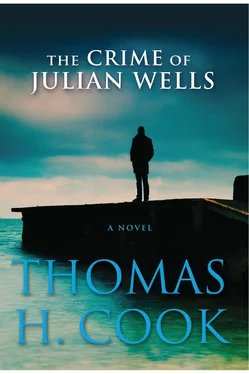Thomas Cook - The Crime of Julian Wells
Здесь есть возможность читать онлайн «Thomas Cook - The Crime of Julian Wells» весь текст электронной книги совершенно бесплатно (целиком полную версию без сокращений). В некоторых случаях можно слушать аудио, скачать через торрент в формате fb2 и присутствует краткое содержание. Год выпуска: 2012, ISBN: 2012, Издательство: Grove Press, Жанр: Криминальный детектив, на английском языке. Описание произведения, (предисловие) а так же отзывы посетителей доступны на портале библиотеки ЛибКат.
- Название:The Crime of Julian Wells
- Автор:
- Издательство:Grove Press
- Жанр:
- Год:2012
- ISBN:9780802194589
- Рейтинг книги:5 / 5. Голосов: 1
-
Избранное:Добавить в избранное
- Отзывы:
-
Ваша оценка:
- 100
- 1
- 2
- 3
- 4
- 5
The Crime of Julian Wells: краткое содержание, описание и аннотация
Предлагаем к чтению аннотацию, описание, краткое содержание или предисловие (зависит от того, что написал сам автор книги «The Crime of Julian Wells»). Если вы не нашли необходимую информацию о книге — напишите в комментариях, мы постараемся отыскать её.
The Crime of Julian Wells — читать онлайн бесплатно полную книгу (весь текст) целиком
Ниже представлен текст книги, разбитый по страницам. Система сохранения места последней прочитанной страницы, позволяет с удобством читать онлайн бесплатно книгу «The Crime of Julian Wells», без необходимости каждый раз заново искать на чём Вы остановились. Поставьте закладку, и сможете в любой момент перейти на страницу, на которой закончили чтение.
Интервал:
Закладка:
All literature skirts the otherwise insurmountable issue of man’s many different languages. Fictional characters roam from country to country miraculously speaking whatever language they encounter. The fictional character is sent from London to Istanbul and gets off the train in a city in which everyone speaks English. Throughout the fictional world, the Tower of Babel ever lies in ruins, so that upon first encounter with an African bushman or a Bedouin trader, all indecipherability vanishes, and our hero immediately engages in a profound discussion of life, death, and eternity, when, in actuality, he would have been struggling to locate the nearest watering hole.
This is to say that it was not within my power or Loretta’s to simply head out of Budapest and locate Irene Josag somewhere in the wilds of Slovakia without assistance. Arrangements had to be made, and several days were required to make them, a time during which Loretta and I strolled the streets of the city, took in its churches and museums and monuments.
By then I’d spoken often enough with the hotel manager to have gained some slight knowledge of the city, at least enough to add a bit of local history to our strolls about the city.
“After the fall of the Soviet Union, the Russians were required to take away all the other monuments they’d erected to themselves in Budapest,” I told Loretta. “All the plaques and red stars, everything.” I pointed to a pedestal upon which rested a single pair of boots. “Of course the Hungarians had already beheaded the statue of Stalin. In fact, they cut him all the way down to his boots.”
We turned and walked on for a time, now closing in upon the Danube.
“I remember something Julian once told me,” I said. “He said that a traveler enters the world into which he travels, but a tourist brings his own world with him and never sees the one he’s in.”
“Where did he say this?” Loretta asked.
“In Buenos Aires,” I answered.
She walked on without speaking until she suddenly stopped and said, “Then Julian must, at some point, have no longer thought of himself as a tourist there.”
“But that’s what he was,” I told her, then returned to my meeting with Hendricks, how he’d seemed contemptuous of Julian’s “quixotic” effort to find Marisol. “And in a way, I think Hendricks was right about Julian,” I said. “Because in a sense, he was a tourist. How could he have been anything else?”
“By being drawn into the turmoil,” Loretta answered.
“How might that have happened?”
Her expression was pure collusion, as if we two were now in league, testing the same conjectures, exploring the same possibilities.
“I’ve been thinking of something you said the night you called me and told me you were going to Hungary,” Loretta answered. “It was about the report on Marisol, the fact that she might have been a spy. You mentioned that she hadn’t been with anyone important as a guide but that she might have gotten the idea that you or Julian could have known something.”
“Or some one -namely, my father,” I said.
“Yes,” Loretta said. Her gaze became quite intense. “And I thought, if she actually was a spy, she might have had a completely different idea about Julian. Not as someone who knew something but as someone who might later be in a position to know something.”
“I’m not sure where you’re headed.”
“That she might have thought he had access to information,” she answered. “Or at least that he could gain access to it. Information from your father, for example. And so, for that reason, she might have tried to turn Julian. That’s the term, isn’t it? To ‘turn’ someone?”
“You mean Marisol might have tried to turn Julian into a traitor?”
She saw how unlikely I thought that was.
“It’s the oldest turn there is, Philip,” she reminded me. “As a matter of fact, it goes back to Eve.”
There was Jezebel, too, and Delilah. The list of female deceivers is very long indeed. Could Marisol have been such a woman? If so, her disguise was quite brilliant, for I had no inkling that she was anything other than an admirable young woman, dutiful and striving, who simply wanted a fighting chance.
And yet, the photograph I’d found in Julian’s apartment couldn’t be denied. Marisol seated with Emilio Vargas, leaning toward him, whispering in his ear. Might she have targeted a young man who was naive and inexperienced in the ways of intrigue, one already determined to do some great good in the world, romantic and idealistic, a well-connected young American she could “turn”?
I thought again of the photograph, Marisol’s lips at Vargas’s ear.
Might she have been whispering the name of this young man?
It was only a question, and yet I could almost hear the name she whispered.
Julian, I thought, and on that name, I once again recalled the time he got into an argument with me over some small detail, how uncharacteristically wrong he was, and how, to prove him so, I rushed back to my room to find the evidence. It was just after Father Rodrigo’s departure, and I’d left him with Marisol at a small cafe near San Martin. I’d returned to find them talking very somberly, and at that moment, as I thought now, they had truly looked like two conspirators caught in a moment, to use Rene’s phrase, “of dark conclave.”
As if it were a surveillance photograph, I saw Julian at the instant he suddenly caught me in his eye, his expression not unlike that of a little boy caught in a disreputable act.
Had I caught him? I wondered now.
And had the “crime” he’d long ago claimed that I had witnessed been his treason?
There are times when no alternate route presents itself, so that your only choice is to continue down the road you’re on. Now that road led out of Budapest.
By the time I took it, I’d secured the service of a guide. His name was Dimitri, and he was quite young and eager, utterly unlike Rene. On the way to Irene Josag’s village, he spoke of his great love of English, how assiduously he read the great writers of that language. He was astonishingly impressed to learn that I was a critic and that Loretta was the sister of what he called a “real writer,” though he was quick to admit, not without apology, that he’d never heard of her brother.
“What is again the name of your brother?” he asked as he pulled out a small notebook.
“Julian Wells.”
“I am sorry to say that I have not read his books,” Dimitri told her, “but I am certain that I will very soon search for them.”
Loretta promised to send him some of Julian’s books when she returned to the States, and when we stopped for lunch, Dimitri responded by gathering her a bundle of wildflowers.
After that we drove on, now through a countryside that felt increasingly dense.
“There’s Cachtice,” I said when it came into view. “Countess Bathory’s torture chamber.”
Loretta’s gaze grew more intense as she peered at it, but the intensity was combined with noticeable dread.
“Are you sure you want to go to the castle?” I asked cautiously.
To my surprise she was, so Dimitri drove up the winding road that led to the ruin.
It was not overwhelmingly large, and as in the case of many such places, the walls had long ago been pulled down. The tower still stood, however, along with an imposing foundation whose broken stones we walked together, the great sweep of the countryside stretching below us as far as we could see.
It was within these now-crumbled walls that countless agonies had been inflicted upon the countess’s victims, Elizabeth growing steadily more vicious as one year quite literally bled into another. Here she had starved and beaten and burned and slashed the bodies of innumerable innocents, while screaming obscenities so vile they shocked even the blood-spattered minions who helped carry out her tortures.
Читать дальшеИнтервал:
Закладка:
Похожие книги на «The Crime of Julian Wells»
Представляем Вашему вниманию похожие книги на «The Crime of Julian Wells» списком для выбора. Мы отобрали схожую по названию и смыслу литературу в надежде предоставить читателям больше вариантов отыскать новые, интересные, ещё непрочитанные произведения.
Обсуждение, отзывы о книге «The Crime of Julian Wells» и просто собственные мнения читателей. Оставьте ваши комментарии, напишите, что Вы думаете о произведении, его смысле или главных героях. Укажите что конкретно понравилось, а что нет, и почему Вы так считаете.












